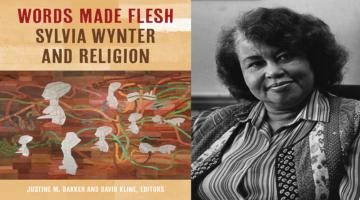Black writers have underscored the possibilities and challenges of black internationalism through their innovative adaptations of black music.
“The interaction of jazz improvisation with forms of social improvisation is especially meaningful for the formation of new communities.”
In this series, we ask acclaimed authors to answer five questions about their book. This week’s featured author is John Lowney. Lowney is Professor of English at St. John's University. His book is Jazz Internationalism: Literary Afro-Modernism and the Cultural Politics of Black Music.
Roberto Sirvent: How can your book help BAR readers understand the current political and social climate?
John Lowney:Jazz Internationalism reconsiders the significance of jazz during the Long Civil Rights Movement, from the 1930s through the 1960s. While most studies of African American jazz literature have concentrated either on the Harlem Renaissance or the Black Arts Movement, I examine the literary response to jazz during the decades when it achieved its greatest popularity and respect, nationally and internationally. I begin with the premise that American literary studies have been shaped by institutional processes of historical amnesia associated with the Cold War. Despite the importance of jazz for the interracial Popular Front, there has been limited attention to the invocation of jazz as a mode of Left social criticism by Afro-modernist writers during and after the 1930s. I began this study with archival research on Langston Hughes’s Cold War writing, following research I had done earlier on Montage of a Dream Deferred for a previous book, History, Memory, and the Literary Left: Modern American Poetry, 1935-1968. This new research expanded and intensified my interest in the internationalist scope of writing such as Hughes’s Ask Your Mama, which has been underappreciated because its experimental blend of jazz poetics with radical internationalist politics defies expectations of African American Left writing.
“There has been limited attention to the invocation of jazz as a mode of Left social criticism by Afro-modernist writers during and after the 1930s.”
In articulating a new history of Afro-modernist jazz writing, Jazz Internationalism relates recent jazz historiography to current theoretical articulations of black internationalism, including articulations of socialist, diasporic, and black Atlantic paradigms of internationalism. And in discussing how jazz is deployed as a mode of radical social and political criticism in Claude McKay’s Home to Harlem, Ann Petry’s The Street, Paule Marshall’s The Fisher King and the jazz poetry of Frank Marshall Davis, Bob Kaufman, and Hughes, I examine specifically how black writers have underscored the possibilities and challenges of black internationalism through their innovative adaptations of black music. Each of these writers is attuned to the resonance of radical writing on the urban streets they document, which makes their writing especially important for current iterations of the Black Lives Matter movement as well as the earlier Civil Rights movement.
What do you hope activists and community organizers will take away from reading your book?
Jazz Internationalismcombines new research on canonical writers such as McKay, Hughes, and Petry with intensive reconsideration of writers and texts that are less widely known. Because these writers represent quite different scholarly constituencies, including the Harlem Renaissance (McKay and Hughes), the Black Chicago Renaissance (Davis), the Beat movement (Kaufman), African American feminist writing (Petry and Marshall), and Afro-Caribbean writing (McKay and Marshall), this book is addressed to a wide range of readers. It appeals not only to scholars in African American literary and cultural studies, but also to undergraduate and graduate students and general readers interested in jazz studies. Activists and community organizers would be interested not only in the intercultural interactions that are featured by these writers, but also the roles jazz plays in these interactions. Each of the writers stresses how jazz improvisation functions as both a utopian mode of possibility and a creative process of remembrance. The discipline of skillful improvisation cannot be underestimated, and the interaction of jazz improvisation with forms of social improvisation is especially meaningful for the formation of new communities.
We know readers will learn a lot from your book, but what do you hope readers will un-learn? Is there a particular ideology you are trying to dismantle?
There have been a number of outstanding studies that articulate the importance of black music for Afro-modernist literary production since Paul Gilroy’s widely influential The Black Atlantic: Modernity and Double Consciousness (1993). What differentiates Jazz Internationalism from previous literary and cultural studies of jazz writing is its historical scope, which concentrates most intensively on the historical period from the 1930s through the early 1960s. These decades feature the development and impact, nationally and internationally, of the modern African American civil rights movement. What has become increasingly recognized as the “Long Civil Rights Movement” coincides with the period in which jazz achieved its greatest popularity and respect as an African American mode of cultural and artistic expression. As Nikhil Pal Singh, Jacquelyn Dowd Hall, Glenda Elizabeth Gilmore, and other civil rights historians have argued, extending the movement historically, to include 1930s and 40s activism, and geographically, to encompass urban sites in the North, restores the impact of radical movements on civil rights struggle. It also deflates the myth that the South was exceptional in its racist practices. This historical framework has informed African American cultural studies, especially studies of African American radicalism and black transnationalism. It also informs the new jazz studies, particularly in scholarship that addresses the social and political implications of jazz and its reception. It is interesting, then, that the correspondence of the African American civil rights movement with the popularity of jazz has not received more attention in African American literary studies, beyond studies of individual canonical writers such as Ralph Ellison or James Baldwin. If there is one assumption that readers could “un-learn,” it would be the historical limitation of the civil rights movement, which represses continuities with the earlier Left as well as continuities and discontinuities with civil rights advocacy after 1965. This book suggests not only a history of Afro-modernist jazz literature that coincides with the long civil rights movement. It also accentuates the intertextuality of jazz literature as it evolves through several generations of black music and writing.
Who are the intellectual heroes that inspire your work?
The intellectual heroes that inspire my work include the writers who are featured inJazz Internationalism and related scholarship that I have pursued. Other intellectual heroes include activists and artists who have dedicated their lives to their work and constantly challenged themselves. Martin Luther King, Jr. has inspired me for his tireless pursuit of justice, especially where it seemed most unlikely. King marching for housing rights in Chicago or for the rights of garbage workers in Memphis is more powerful because the expectations were so challenging. It didn’t hurt, of course, that King was a brilliant speaker and writer. Among jazz musicians John Coltrane stands out not only for his brilliance as a saxophonist, but also for his dedication to developing his repertoire, whether to “political” music in “Alabama,” for example, or to the more expansive compositions of his later years. I would also like to celebrate the musicians who developed new forms of jazz through their interaction of African American and African forms of music. One notable musician from my book would be Randy Weston, who is still inventively performing and recording at age ninety.
In what ways does your book help us imagine new worlds?
All of the writers I study in Jazz Internationalism inhabited new worlds in their later years. After years of travel, Claude McKay moved to Chicago and converted to Catholicism. Frank Marshall Davis moved to Honolulu and mentored younger people, including Barack Obama. Langston Hughes worked and worked and worked until he no longer could. Ann Petry returned to Connecticut and wrote children’s books as well as additional novels. Bob Kaufman took a vow of silence when President Kennedy was assassinated and didn’t speak again in public until the end of the Vietnam War. Paule Marshall wrote a memoir of her life as a writer in New York, the Caribbean, and Africa. All of these writers reinvented themselves when circumstances changed. This perseverance is exemplary, but it is the sense of hope, the openness to possibility, that helps us to imagine new worlds.
Roberto Sirventis Professor of Political and Social Ethics at Hope International University in Fullerton, CA. He also serves as the Outreach and Mentoring Coordinator for thePolitical Theology Network. He is co-author, with fellow BAR contributor Danny Haiphong, of the new book, American Exceptionalism and American Innocence: A People’s History of Fake News—From the Revolutionary War to the War on Terror.
COMMENTS?
Please join the conversation on Black Agenda Report's Facebook page at http://facebook.com/blackagendareport
Or, you can comment by emailing us at comments@blackagendareport.com



















